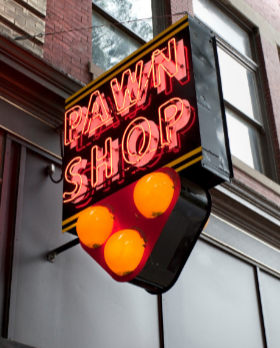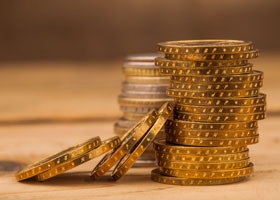FAQs
History of Pawn
Pawn lending is not a new business. In fact, some reports trace pawn loans back at least 3,000 years to ancient China, as well as Greek and Roman civilizations. Pawning has long been a source of capital for people, as well as a way to finance business ventures. According to the National Pawnbrokers Association, even Queen Isabella of Spain pawned her royal jewels to finance Christopher Columbus’s voyage to the New World. Pawnbrokers loan money to people based on the value of the item(s) they pledge as collateral. Historians differ on the origin of the pawn symbol of three gold balls. Some contend that balls represent the rocks that Charles the Great used to slay a giant; others contend the balls represent gold coins or bags of gold. No one knows for sure, and the symbol remains the trademark of the industry.
Frequently Asked Questions on the Pawn Business
1. How does a pawn loan work?
Pawn is another word for collateral loan. Pawn loans are a quick and easy way to borrow money without a credit check or hassle. Loans are strictly based on the value of the collateral, not your credit rating or pay schedule. In Pennsylvania the loan term is 4 months, plus a grace period. If you cannot pay back your loan in full, including the applicable grace period, we offer renewals to provide you with extra time. You may choose to surrender your collateral as payment. With a renewal, you pay the interest that has accrued on your loan in full, and a new loan is written. The principle loan amount remains the same as does the interest, and the due date is reset for the full loan term.
2. Why would someone go to a pawnbroker to get a loan?
Pawnbrokers offer the consumer a quick, convenient and confidential way to borrow money. A short-term cash need can be met with no credit check. There are no legal actions or consequences if the loan is not repaid. There is no threat of legal action when a customer defaults on a loan. Pawn broking imposes a discipline on the borrower that other lenders do not. Pawn loans do not cause people to overextend credit or go into bankruptcy.
3. Should I pawn or sell?
The decision whether to pawn or sell is entirely up to you. Your decision should be based upon whether or not you want to retain the item. When items have emotional value, using the item as collateral for a loan makes sense. The option of a collateral loan on your property is an option that isn’t provided by gold buyers and jewelry stores. To learn more checkout our Sell VS Loan page.
4. Will I lose my merchandise?
More than 90% of our customers repay their loans and retain their collateral. When the customer chooses not to repay the loan, their loan collateral is forfeited. Safe and secure. While your item is in pawn, you still retain ownership of it. Your item is fully insured and safely stored until you pay off your loan in full and claim your collateral.
5. How do you determine an item’s value?
We base the loan amounts on the value of the item, its current condition, and our ability to resell the item. We use a variety of resource tools to determine value and strive to get you the most money we can. We test precious metals and diamonds to determine purity and authenticity.
6. Are pawnshops regulated?
Yes, pawnshops are highly regulated. The Commonwealth of Pennsylvania’s Department of Banking licenses and regulates pawnshops.
7. Are pawnshops stocked with stolen merchandise?
Pawnshops are actually the worst place to try and turn stolen items into cash. Pawnshops are highly regulated and work closely with local and federal law enforcement officials.
8. What happens to the jewelry people don’t redeem?
Contrary to popular belief, more than 94% of our customers come back and redeem their items. The 6% who don’t come back supplies us with one of the best selections of jewelry for sale in Western Pennsylvania. More importantly, because our costs are so much lower than our competitors, you can find bargains on diamond rings, watches, bracelets, earrings, gold chains and more at less than half the prices charged by conventional retail jewelry stores.

Sparklez Jewelry & Loan is located in Pittsburgh, PA and offers jewelry backed loans, pawn services and we buy and sell jewelry.
Looking to pawn jewelry, precious metal or coins?
Call us at 412-835-8805
Frequently Asked Questions on Selling Gold
1. How will you weigh my gold, in grams or pennyweights?
CORRECT ANSWER: Grams.
REASON: Grams are today’s industry standard, when a Western Pennsylvania gold buyer says he will weigh the gold in pennyweights, he will be the exception. Those who weigh gold in pennyweights often give poorer buying offers, depending on their policy regarding the rounding of amounts. You should ask a potential gold buyer if he is at least willing to weigh your gold in grams and do all of the calculations in grams for you. This will make it easier for you to comparison shop.
2. How much are you paying per gram today for 14 karat gold (or 10K, or 18K, etc.)?
CORRECT ANSWER: According to today’s market price of gold, we are paying ___ per gram for 14K gold (or 10K, or 18K, etc.).
REASON: Some gold buyers and refineries will use deceptive techniques in order to get you into their store. For example, they might say, “Today’s gold price is ___ per gram.” Then when you come in they will explain that the price they quoted you on the phone was what they sell gold for, not what they buy it for. They do this in hopes of capturing a certain number of people who will still go through with the transaction despite the “misunderstanding.”
3. Do you pay extra for diamonds and gemstones, or do you deduct for the weight of the stones like some businesses do?
CORRECT ANSWER: With diamonds, it depends on the size, quality, and the way they’re set in the jewelry. For example, if we are buying the jewelry for scrap and the diamonds are very small, of low quality, and set in such a way that it will be difficult to separate them from the gold, then we won’t be able to pay for the diamonds, since taking them out without breaking them could cost more than what they are worth. However, if they are of a certain size and quality, and can be removed from the piece without too much effort, then we will add the value of the diamonds. In the case of small color stones we use similar criteria, except they will be worth substantially less in most cases. In the case of large stones of low-value, we either deduct for the weight of these stones or take them out of the piece and value them separately. In the case of all stones of higher value, such as precious gemstones and diamonds, we will assess their value and add to it to the price we offer for the gold. In the case of jewelry that we do not plan to scrap, we would value the gold, diamonds, and gemstones individually to come up with the final price for the piece.
REASON: You should avoid businesses that say they deduct for the weight of the diamonds and stones, and leave it at that, since this is not a practical blanket policy. They should be willing to assess each item according to the more specific factors, such as those stated above.
4. Do you pay extra for designer gold jewelry? Can you please name a few brands that you pay more for?
CORRECT ANSWER: Yes. For genuine and in-style jewelry brands such as Tiffany, Cartier, Van Cleef & Arpels, to name a few.
REASON: Whether you have any designer gold jewelry or not, it is useful to know that the gold buyer is willing and able to pay more for jewelry coming from a well-known designer, since that means he has the knowledge to buy your jewelry for the correct price it’s worth, rather than just following a blanket policy of paying so much per gram for the gold, since you just might have an antique Cartier or Tiffany piece in your jewelry box that you didn’t even know about (such as one handed down by a relative), and you want to work with buyers who can recognize such pieces, point them out to you, and be willing to pay you a premium for them.
5. How long have you been in business, and what is your background in the jewelry industry?
CORRECT ANSWER: Our store has been in the jewelry business for 25 years. Our store was voted #1 Jewelry Store and received Tribune Review’s Reader’s Choice Award in 2010. We are licensed by Allegheny County Sheriff’s Department as Precious Metals Dealers and by the Pennsylvania Department of Banking as pawnbrokers.
REASON: In rough economic times like these, there are hundreds of new people and companies getting into the gold buying business looking to prey on people’s unfortunate circumstances. These are the kind of businesses that immediately offer you a higher amount when you reject their first buying offer; and then a higher cash amount again when you reject their second offer. As with any kind of serious business transaction, you want to be dealing with proven professionals with expertise in their field so as to achieve the best results.
6. Will you pay me today by cash or by check?
CORRECT ANSWER: We will pay you today in cash.
REASON: When you sell your gold, you should have cash in your hand TODAY. That is the industry standard among professional gold jewelry buyers. If the buyer says that they will give you a business check or personal check, search for another gold buyer.

Our business has 29 years of experience with buying and selling gold. Our store is located in Pittsburgh, PA.
Planning to sell your gold jewelry?
Call 412-835-8805
